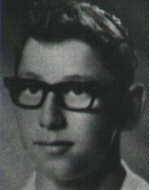Leibowitz, Yehuda-Benjamin (“Libo”)
Son of-Avraham-David and Leah. Born on 29 November 1949 in Kiryat Ata, his parents were immigrants who had recently arrived in Israel and began to build their family’s nest after the Holocaust, Etzion “in Kiryat Ata, where he joined the Bnei Akiva movement and participated in the summer camps of the movement and its labor camps, and he was loved and loved by all his friends who saw him as an undeclared leader. His friends were also connected to him and he was in contact with them at the Achva and Re’ut meetings, and after graduating from elementary school, he wanted to go to the Bnei Akiva yeshiva in Kfar Haroeh, His parents sent him for an extra Bible “high school in Hadera -” Beit Shmuel “, also for the reputation and because his uncle resided in her room (paternal) and that it would be easier to leave the house of Judah long term. Here too he became fond of his friends who respected him and loved him. From time to time, on free sabbaths, a friend brought a guest to sit with him. In particular, he tried to bring students from abroad and did everything in his power that his guest would feel like a homeowner and make sure that he would enjoy the Shabbat. He spent four years in Yeshivah. He was a good student, active and responsible, and therefore his contemporaries chose him as the rabbi of the synagogue of the Yeshiva. He was also active in training at the Hadera branch during his leisure time. After his studies, he was only 17 and a half, and he quickly enlisted with the members of the nucleus to the Nahal Brigade and tried to persuade him to continue his yeshiva studies for at least another six months until his time to enlist. Make me ashamed! “Yehuda signed up for the IDF in July 1968. When he arrived at the training camp, he was assigned to low-quality soldiers because of his poor eyesight. But he refused to accept this and asked the doctor to raise his health. He succeeded and went out for training with the guys. When he took the holidays, he told the parents that the training was not difficult at all. He also refused to take pocket money, claiming that his salary in the army was enough for him. At the end of the training he went out with the nucleus to Ein Tzurim and there, too, his life was not easy. He worked in various jobs and learned how to drive a tractor and was very Simcha about it. During his few vacations, he also devoted time to visits to the homes of his friends, who had been in close contact with them. He also visited the yeshiva and studied there. Yes, he traveled a lot in Israel out of his love for nature and its landscapes. During his service in the Nahal Brigade, he was fond of kibbutz life, and in his conversations with his parents he expressed his desire to join the kibbutz after completing his military service. When his parents claimed that this was more than his strength, he replied: “Was this why I enlisted in the Nahal Brigade in order to be a storekeeper or a cook in the army?” In their hearts the parents feared for his safety, but they were proud of their brave son. He and his parents were very Simcha when he received the jump wings. After the parachuting course, he was sent to the Jericho area with his unit, but never told his parents that he was near the border, so as not to worry them. He always reassured them that he would soon return to the farm. He loved the house, and at every opportunity he called, in a letter or on the phone, and on his few vacations he would “jump” to see what was happening even for a while. Just as he was a devoted son to his parents and his people, he was loyal to the religion of Israel and his army and meticulous in the commandments between man and place. More than once he happened to get a late Sabbath break and preferred to stay in the camp, lest he be able to arrive before Shabbat. He went out and before he reached his house, he saw that the sun was fallingM stopped the car and came home on foot to avoid desecrating the Sabbath. On 9 Iyar 5729, the parents were informed that their son had been seriously injured in the Jordan Valley and had been transferred to Hadassah Hospital in Jerusalem, where his parents rushed to the hospital and informed him of his difficult condition. The parents were surprised at his peace of mind, and the nurses who received him when they brought him to the hospital told the parents how calmly he had borne his pain. “On 30.4.1969 ), Received an internal hemorrhage and the efforts to save him were of no avail.was brought to eternal rest in the Kiryat Ata cemetery in a letter of condolence to the family, As’ one of the soldiers disciplined and excel in the department and the entire company. “The Committee eternalize the name of Judah Benjamin published a book in his memory called” Judah Lev “.
